One of the most frequently asked questions when going to the dentist does it hurt to treat caries. Sitting in a chair, we warn doctors that we have a low pain threshold anyway, we are just afraid.
The doctor will select a drug that will make treatment comfortable and painless, even in the most difficult cases.
Today cure tooth decay can be painless.
Without anesthesia
In rare cases, doctors have to carry out the treatment without anesthesia. This usually happens when the presence of Allergy to anesthetics. Intolerance to a patient drugs a doctor may suggest treatment with a laser or chemicals. Also a possible option General anesthesia.
As a rule, the majority of men prefers to carry out treatment under local anesthesia. But there are daredevils who have a high pain threshold or prefer to do without the injection.
If we are talking about superficial caries when the tooth is still intact, then it’s understandable. But at the medium and deep caries without anesthesia the pain almost impossible to endure. Yes and no – anesthetics recent generations do not cause allergic reactions, they can be used even in the treatment of children and pregnant women.
In the treatment of teeth meaning no heroics – without anesthesia would hurt. And talk about the economy makes no sense.
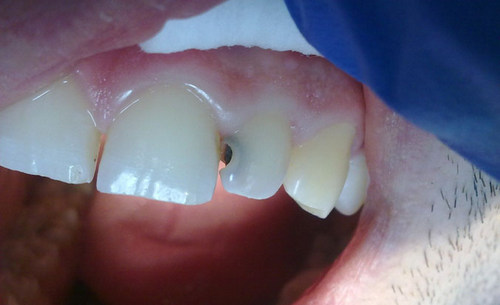
On the front teeth
The main feature of decay on the front teeth is that it is developing very fast. Due to the high load enamel fast thinner, allowing the tissue destruction is progressing rapidly. In advanced cases begins severe pain, especially during meals. It is also necessary to say about the aesthetic moment – the decay on your front teeth instantly attracts attention.
Under local anesthesia to treat tooth decay on the front teeth does not hurt. Perhaps the doctor will increase the dosage of the drug to completely eliminate the sensitivity.
Important. If you notice a spot or initial caries in the anterior teeth, we recommend you immediately contact your dentist. Extending the time, you risk losing the tooth in plain sight. And this is the additional cost of prosthetics.
Cervical caries
The majority of patients think that the treatment of cervical caries is particularly painful. In principle, it is for the cervical area exhibits a high sensitivity. Without anesthesia, without a doubt, will be hurt.
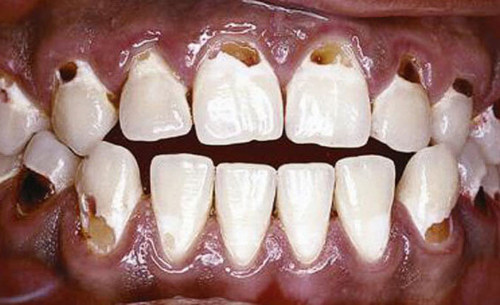
Cervical caries can be not only “in sight”, but spread inland. Therefore, the question of the treatment without anesthesia.
Middle caries
With an average caries is not only enamel, but already addressed and dentin. The disease is at this stage virtually asymptomatic, may be a manifestation of sensitivity when biting.
Treatment of middle caries is under anesthesia, allowing the patient to experience discomfort and feel completely comfortable.
Deep caries
For deep caries characterized by extensive damage of hard tissues of the tooth. Pain occur during times of food and under the effect of temperatures – the tooth reacts to hot and cold. Carious cavity is separated from the pulp in a thin layer of dentin, which explains the much increased sensitivity of the tooth to stimuli.
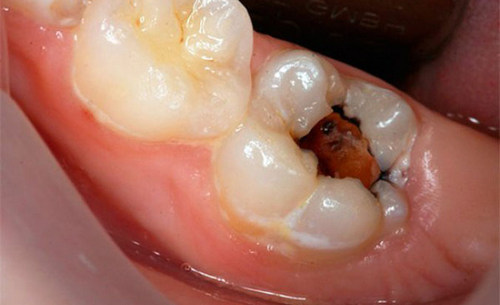
Deep caries without anesthesia not treated. The use of anaesthetics leads to a comfortable state of the patient in the treatment process in the absence of pain.
Why dental caries, toothache
Basically painful sensations appear already at the stage of deep caries. In this case, the pulp (nerve tissue of the tooth) is separated from oral cavity by a thin layer of dentin and responds to stimuli. Pain occurs when brushing your teeth, when getting food in a cavity, and spicy-sweet-salty.
Under the influence of irritants in the pulp increased blood flow, which causes excess pressure on nerve fibers. The pain goes away fairly quickly, immediately after the removal of the stimulus.
Important. Without treatment deep caries enters the pulpit. The inflammatory process affects nerve fibers, the pain slowly becoming unbearable – constant or throbbing, sharp or dull, localized or pervasive.
Stages of tooth decay
The causes of tooth decay can be attributed to hereditary factor, the quantity and quality of saliva, a violation of protein and mineral metabolism in dental tissues. Important role to play in oral hygiene as well as excessive consumption of sweets. Another factor contributing to the appearance of caries – lack of calcium and phosphorus in the diet. Teeth can rapidly deteriorate during pregnancy or after the transfer of infectious diseases.
Caries develops gradually. Over time without treatment virtually invisible spot appears carious cavity, which at some point starts to increase, affecting a growing number of dentin.
Experts distinguish four stages of development of caries – carious spot, surface caries, middle, deep caries.
Caries in stage of spot
The initial stage of caries. Characterized by the appearance of the enamel stains. At the demineralized area observed damage to the structure of the enamel. As a rule, the patients themselves to detect it can’t.
The spot can be white or pigmentirovannymi. If a brown or black stain is quite easy to notice, that coated can be diagnosed only by using aqueous solution of methylene blue.
Important. If timely treatment is possible to conduct conservative therapy to restore tissue. That is why experts recommend visiting the dentist every six months – in time to take action and not to develop tooth decay.
The carious spot treated with a solution of sodium fluoride and calcium fluoride. The patient is assigned vitamins, preparations of calcium and phosphorus, it is recommended brushing your teeth fluoridated toothpaste. Also, the doctor may recommend a special diet that includes foods with a high content of calcium and certain proteins.
Surface caries
Affects only the enamel was damaged and not recoverable. At this stage it is already possible response of the damaged tooth to cold or hot.
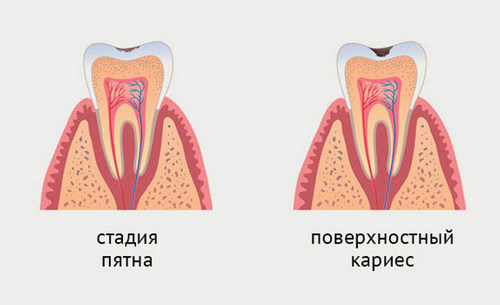
The caries affects only the upper part of the tooth affecting the dentin. At this stage already requires treatment. The dentist removes with a drill damaged tissue and sets the seal.
As the caries has not yet struck the tooth, the treatment can be carried out without anesthesia. But if you have a low pain threshold or you simply overpowers the fear of the drill, still need a local anesthesia.
Middle caries
In the third stage tooth decay already affects the tissues of the tooth – the dentin. A small carious cavity, tooth is starting to bother and hurt. He reacts to getting cold air when talking or breathing, food debris, hot and cold.
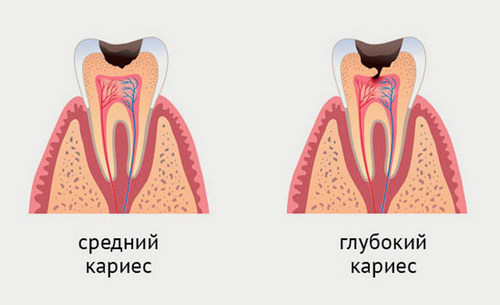
Manipulation is performed under anesthesia, as the patient may experience quite severe pain. Depending on the degree of tissue damage, the dentist selects the desired treatment. In most cases, is carried out preparation of carious cavity, removal of the infected tissue, filling.
Deep caries
The process extends to the deep tissues of the tooth, with the pulp protects only a thin layer of dentin. Patients complain of intermittent pain from cold, hot, sweet, sour.
Treatment is carried out under anesthesia.
Analgesia in the treatment of
For local anesthesia using drugs on the basis of articaine and mepivacaine. Preparations of articaine kind exceed the efficiency effects of the novocaine – 5-6 times, lidocaine is 1.5-2 times.
Most anesthetics contain in addition to the main active ingredient components vasoconstrictor – adrenaline or epinephrine, which reduces the washout of anesthetic, which leads in turn to an increase in the duration of exposure time and strength of analgesia.
To articaine anesthetics include:
Ultrakain
French drug available in Kabalah volume of 1.7 ml in three forms:
- Ultracain DS Forte containing epinephrine 1:100 000. Highly effective anesthetic for operations and treatment polerowanej teeth. It is not recommended for patients with thyroid diseases and cardiovascular pathologies.
- Ultracain DS – with a concentration of epinephrine 1:200 000. Ideal for pain management pregnant and lactating women and patients with compensated cardiovascular disease.
- Ultracain D – without adding adrenaline/epinephrine. Used in high risk allergic reactions. You can use patients with bronchial asthma, cardiovascular pathologies, diseases of the thyroid gland.
The drug can be used, starting from the age of four.
Ubistesin
Effective anesthetic (Germany), the composition and force of impact is Ultracain.
Released in two forms:
- Ubistesin Forte – with a concentration of epinephrine of 1:100,000;
- Ubistesin is the concentration of epinephrine is 1:200 000.
Septanest (France)
Released in two forms with the content of adrenaline 1:100 000 and 1:200 000. Unlike the Ultracain and Ubistesin in the anesthetic composition comprises preservatives that have strong allergenic properties.
On the basis of mepivacaine release drug Scandonest. The anesthetic does not contain any preservatives and vasoconstrictor agents. Recommended for anaesthesia of pregnant and lactating women suffering from cardiovascular diseases, asthma and diseases of the thyroid gland.
Important. When referring to the dentist be sure to tell your doctor if you have allergies or chronic diseases. This will help the doctor to choose the right for you need the anaesthetic.
Will it hurt when the needle in your gums
For anesthetic use special carpool syringe with a very thin needle, which allows to minimize discomfort during injection. The drug is administered very slowly for 40-45 seconds.
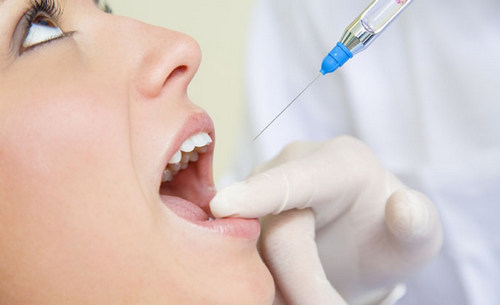
In most hospitals before the injection is carried out so-called applicative anesthesia using a special anesthetic gel or septic tank. While anesthetized a specific area of mucosa to which the composition was applied. Entrance of the needle in this case will be painless.
When you need to go to the doctor, symptoms
Do not delay going to the dentist, if you had even a slight pain. The mere fact of pain suggests that began to develop caries, which in some cases affects the tooth almost immediately.
When you need to go to the doctor:
- pain when biting;
- pain from thermal and chemical irritants;
- the pain from contact with cold air.
Without a doubt, the best option is once in six months to appear for examination to the dentist to take timely measures to prevent the development of caries.
Complications
The teeth themselves are not treated. In any case you will have to the doctor, but better to do it as early as possible. If so happened that you are for any reason delayed the process, be prepared for the fact that dental caries go into pulpitis or periodontitis.

The pain in such cases, it becomes unbearable, throbbing, pulling, almost uninterrupted. At some point, the patient will not even be able to tell which tooth hurts, as the pain can capture the entire jaw and given to eye, ear, temple.
Prevention of dental caries
Without a doubt, your teeth need regular care – hygiene of the oral cavity to regularly go to the dentist, eat right. Adversely affects the condition of teeth, Smoking, strong coffee, sweet. Formed as a result of fermentatio saliva lactic acid gradually destroys the enamel, causing caries begin to form spots.
A few simple rules that will help to avoid tooth decay:
- brush thoroughly;
- rinse your mouth after eating;
- use dental floss to remove food.
The rest will tell you the dentist depending on the condition of your teeth. You may need to introduce a diet that is rich in calcium. Or to change toothpaste.


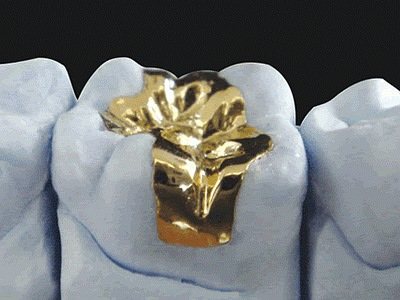

That’s incredibly informative. May I ask a few questions?